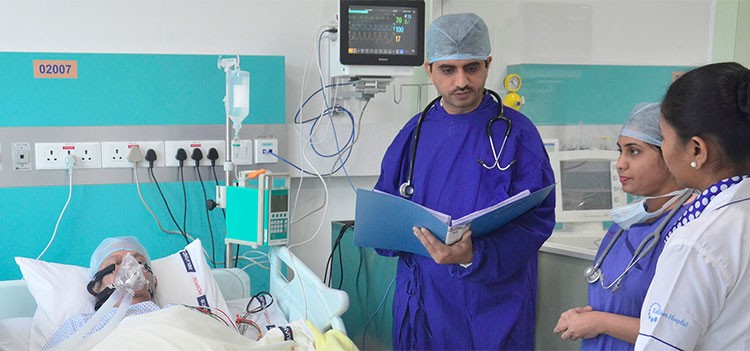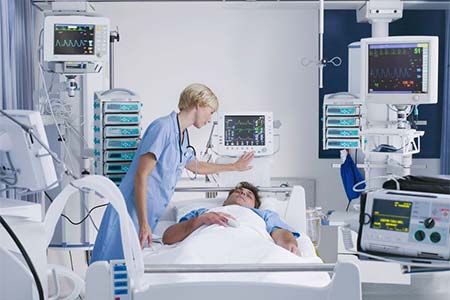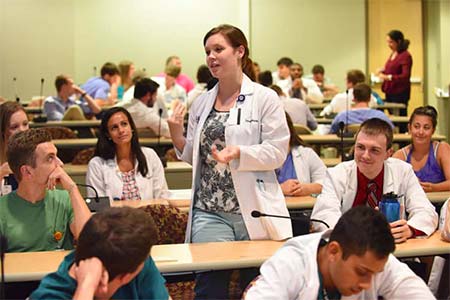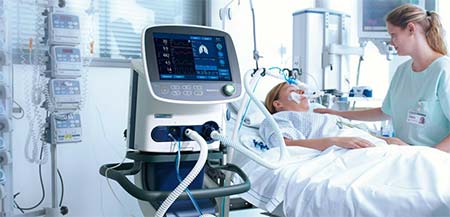Are you worried about the career opportunities after your B.Sc Critical Care Technology?
Are you interested to know about the avenues available after B.Sc Critical Care Technology?
Read this article till the end to know more!
-
The increase in the advancements of healthcare and medicine has increased the lifespan of the people.
-
The increased lifespan in people means they are more prone to diseases. The changed lifestyle of the people has resulted in the development of various diseases at all the ages of the population..
-
The B.Sc Critical Care Technology students will be seen working in hospitals, nursing homes, trauma centres, community health centres, emergency response teams, rescue teams etc.
-
The B.Sc Critical Care Technology students will be seen largely working in Intensive Care Units (ICU), Critical Cardiac Care Units (CCU) in hospitals, trauma care centres, accident medical units, mobile ICUs, etc
Why choose the B.Sc Critical Care Technology programme?
Every patient’s life depends on the efficiency and skills of critical care technologists. There is no room for error when it comes to the treatment of critically ill patients. The minutest error may have a devastating effect and it may result in loss of life or sometimes livelihood of a family. So, critical care technologies should be extremely careful when it comes to their roles and responsibilities. So, the students who are competent and confident about their roles can only choose to do the B.Sc Critical Care Technology programme.
The B.Sc Critical Care Technology course is formulated to design and teach various aspects like:
- Take care of the patients suffering from critical ailments or diseases
- Techniques to apply basic and advanced life support skills to the patients in intensive care units (ICU) or Critical Cardiac-care units (CCU)
- Study the emergency invasive procedures that can save the life of an individual during a medical emergency
- Techniques to connect the life support equipment to the patients in practical situations
- Study critical care technology related procedures and technicalities
- Learn and observe the correct way to perform emergency procedures before the application of practical knowledge
- They will be studying the skills of first aid and emergency medicine
- They will be studying to perform cardiac stress tests, electrocardiograms (EGC), Cardiopulmonary resuscitation (CPR) procedure in case of emergency
- They will be also trained to maintain the life support equipment in the hospitals
- They are also given the training to note down the observations and readings of the patients and report the same to the physician
What can I do after B.Sc Critical Care Technology?
Some of the job roles available for B.Sc Critical Care Technology:
Junior Resident Intensive Care Units (ICU)
- They are responsible to monitor the patient's respiratory and circulatory parameters and ensure that they are stable.
- They are required to provide treatments for the speedy recovery of the patients and help them to wean from the ventilators.
- They are the most responsible professionals who have expertise in analysing the parameters of the vital organs of the patients.
- They are responsible for follow-up and initiation of management plans in response to any pending laboratory or imaging tests (or handing over of any tests which have not yet been completed, reviewed or acted upon by the end of the day to the oncall housestaff).
- Requesting consultation from subspecialty services, as required, and explaining the rationale for consultation.
- They are responsible to follow up on consultation requests, acting upon recommendations, including initiation of tests or treatment plans.
- They are required to maintain an up-to-date signout list of assigned patients, which includes critical information that is required by the on-call housestaff.
Anaesthesia Consultant & Critical Care
- The main responsibility of the anaesthesia consultant is to advise on the right amounts of dosage, and levels of anaesthesia for the patients who are undergoing the surgery.
- They are responsible to give the exact dosage of the anaesthesia for the patients and should be very careful in judging the patient’s requirement.
- Even a small mistake may end up in fatality and sometimes permanent disability or loss of life.
- They should be very cautious while prescribing the anaesthesia dosage for the patients.
Respiratory Therapists
- The registered respiratory therapists are qualified professionals for performing respiratory therapy on patients suffering from respiratory diseases across the globe.
- They are mainly trained to handle respiratory equipment in hospitals and health care centres.
- They will be given the training to connect the lobes and tubes to the patients.
- They also monitor the readings from the machine and adjust the machine according to the patient's requirements under the proper guidance of the certified physician
Adult Critical Care Specialists
- The adult critical care specialists are seen working in intensive care units (ICU) and critical care units (CCU) in hospitals. They connect the ventilators and other respiratory equipment to critically ill patients.
- They are also responsible for monitoring the readings of the patients through the respiratory equipment.
- They constantly generate reports about the progress of the patients and make them available for the physicians and assist them to decide proper treatments that are to be given for the patients with respiratory disorders.
B.Sc Critical Care Placements
The B.Sc Critical Care Technology placements are available in both government and private hospitals, nursing homes, multi-speciality hospitals, super-speciality hospitals, community health care centres, post-accident trauma centres etc.
Some of the top recruiters hiring B.Sc Critical Care Technology students are:
- Apollo Hospitals
- Manipal Hospitals
- Jayadeva Institute of Cardiovascular Sciences
- Fortis Hospitals
- Hosmet Hospitals
- Columbia Asia Hospitals
- Sparsh Hospitals
- Rainbow Hospitals
- Max Hospitals
- Padmashree Diagnostic Centres
- Dr Reddy Path labs
- Metro Hospitals
- Medanta Health City
- Aster Healthcare
How much does a B.Sc Critical Care technology Professional Earn?
- The B.Sc Critical Care salary ranges between 2 lakhs to 6 lakhs per annum.
- The average fresher will be earning nearly about 3 Lakhs per annum.
- The B.Sc Critical Care technology professional will earn a decent salary in hospitals and health care centres.
How to get admission to B.Sc Critical Care course colleges in Bangalore ?
- B.Sc Critical course is one of the most popular courses that is making some noise in the current industry.
- There is a huge demand for this course, the chances are high that seats may run out very fast and many students may miss the chance of joining this course due to unconventional methods like waiting.
- In order to avoid this the students can opt for Direct admission packages from Galaxy Education.
- The desired students can directly contact us to pre book your seats in top B.Sc Critical Care technology colleges in Bangalore under direct admission mode, so that you will be having the confirmed admissions even before the academic year starts.
Conclusion
The increase in the number of diseases in the people has given room for many allied health care sectors and professionals. Today, MBBS is not needed to join the medical field, but other fields can help the students to join the medical field and help the patients. One such allied health field is B.Sc Critical Care Technology.






